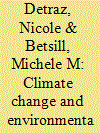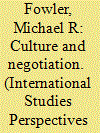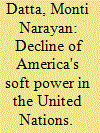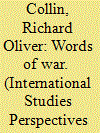|
|
|
Sort Order |
|
|
|
Items / Page
|
|
|
|
|
|
|
| Srl | Item |
| 1 |
ID:
090654


|
|
|
|
|
| Publication |
2009.
|
| Summary/Abstract |
This article explores the implications of the April 2007 United Nations Security debate on the security dimensions of a changing climate for international climate change politics. Specifically, our analysis focuses on whether and how security concerns have been addressed in past international political debates on climate change and considers whether the Security Council debate, which emphasized the threat of climate-related conflict, reflects a discursive shift. We elaborate on two general discourses on the relationship between environment and security, which we call environmental conflict and environmental security. Using content and discourse analysis, we demonstrate that both the historical climate change debate and the more recent Security Council debate have been informed by the environmental security discourse, meaning that a discursive shift has not taken place. We conclude by considering the possibility of a future discursive shift to the environmental conflict perspective and argue that such a shift would be counterproductive to the search for an effective global response to climate change.
|
|
|
|
|
|
|
|
|
|
|
|
|
|
|
|
| 2 |
ID:
090656


|
|
|
|
|
| Publication |
2009.
|
| Summary/Abstract |
This article examines one especially challenging aspect of active-learning international studies courses-the use of cross-cultural simulations. What is the significance of culture for negotiation? What difficulties might cross-cultural negotiations pose, and how might negotiators work with cultural differences to achieve successful outcomes? Is it possible to model the effects of cultures on negotiators in a classroom role-play? What are the advantages to using cross-cultural simulations, and what difficulties do they entail? How might an instructor make best use of materials that focus on cultural issues and their effect on negotiation? When teaching students of different cultures by active-learning methods, what ought an instructor to bear in mind? What cross-cultural simulations are available, and what readings might be assigned to accompany them?
|
|
|
|
|
|
|
|
|
|
|
|
|
|
|
|
| 3 |
ID:
090652


|
|
|
|
|
| Publication |
2009.
|
| Summary/Abstract |
To what extent does anti-Americanism precipitate a decline in America's soft power? Nye postulates a negative relationship, presenting substantial implications for the U.S. national interest. In this paper, I test Nye's hypothesis through an examination of America's political influence within the United Nations. Using a fixed effects model, I regress voting alignment within the UN General Assembly (UNGA) on cross-national, aggregate public opinion toward the United States from 1985 to 2007. Controlling for foreign aid received and alliances with the United States, I find a statistically significant, positive relationship between favorable attitudes toward the United States and voting alignment within the UNGA on overall plenary votes and those votes for which the U.S. lobbies other UN-member states extensively. At the same time, controlling for temporal effects, states are far less supportive of U.S. interests in the UN throughout the tenure of President George W. Bush, capturing the effect of "anti-Bushism" in addition to anti-Americanism. The results of this study shed light on an emerging area of the literature that not only studies the sources of anti-Americanism, but also its consequences.
|
|
|
|
|
|
|
|
|
|
|
|
|
|
|
|
| 4 |
ID:
090655


|
|
|
|
|
| Publication |
2009.
|
| Summary/Abstract |
This article proposes a new interdisciplinary perspective in international relations (IR). It suggests that contributions from perception studies can help us reconceptualize some elements of IR. Specifically, the article takes up the concept of Gestalt and applies it to European integration. The Gestalt laws and phenomena demonstrated by European integration can be identified in other examples of regional integration, as well as in various international organizations, or alliances. They also provide insight into other features of IR, such as the international order. The Gestalt approach per se may contribute to the development of a psychological constructivist theory of IR.
|
|
|
|
|
|
|
|
|
|
|
|
|
|
|
|
| 5 |
ID:
090653


|
|
|
|
|
| Publication |
2009.
|
| Summary/Abstract |
In today's globalized political economy, diplomacy between nation-states (state-state diplomacy) now exists alongside state-firm diplomacy, the negotiations between multinational corporations (MNCs) and the countries in which they do business. While the state must be committed to the interests of its MNCs in the interest of domestic state-firm diplomacy (maintaining a supportive business environment), it still has recourse to address failures in corporate diplomacy and to maintain the appearance of dominance on the world stage. This paper examined these strategies through a critical analysis of prepared testimony at the February 2006 congressional hearing regarding the controversial actions of four U.S. IT MNCs (Google, Microsoft, Yahoo, and Cisco) operating in China. I conclude that when the government is constrained from using its hard power on its MNCs, soft power becomes its most effective tool. Image, suggestion, and appearance-soft power-can be considered more important than legislation itself-hard power-and perhaps even the currency of current state-firm relations.
|
|
|
|
|
|
|
|
|
|
|
|
|
|
|
|
| 6 |
ID:
090651


|
|
|
|
|
| Publication |
2009.
|
| Summary/Abstract |
This paper surveys the linguistic aspects of the Anglo-American occupation of Iraq's multilingual society, focusing first on the multilingual character of Iraqi society and the Arabic, Kurdish, and other languages spoken in this rapidly changing society. Discussion then moves to an examination of the inherent difficulties in working across an English-Arabic/Kurdish divide and concludes by discussing the puzzling inability of the American government to grapple effectively with the linguistic challenges of political and military operations in the Middle East.
|
|
|
|
|
|
|
|
|
|
|
|
|
|
|
|
|
|
|
|
|